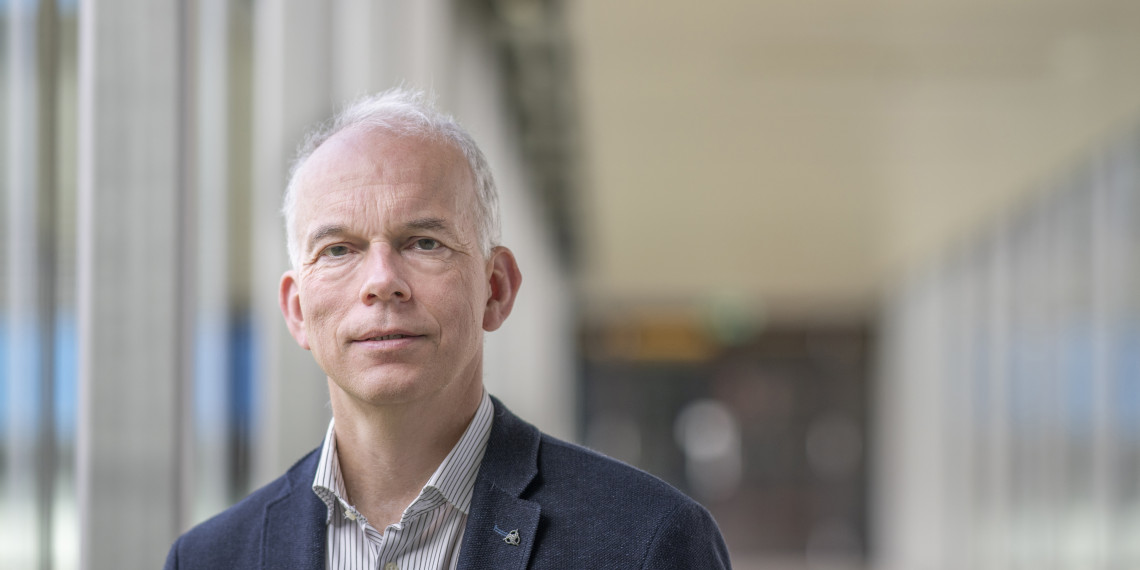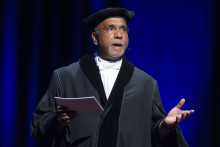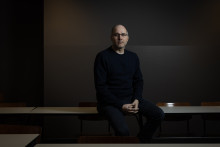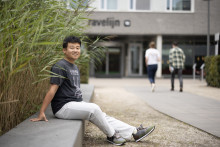By joining the Royal Society, you are part of an illustrious list of scientists such as Isaac Newton, Albert Einstein and Hendrik Lorentz. What does that do to you?
'I see it as a recognition of the work of my group, myself and of the entire field. I've said it before: science is a team effort. The stereotypical image of a professor sitting alone in a room and contemplating, that's just not correct. Such a recognition is one for the work of the group as a whole. I have been working here since 1998 and see the appointment as a recognition of the accumulation of the work of the entire group over all these years. Everyone played a role in that.'
In September you will be 62 years old and five years away from your retirement. Have you already mapped out a plan?
'I'm not retiring. My predecessor, Leen van Wijngaarden, is 93 years old and will also continue. Why should I quit science? It's my passion, my hobby. I still have a lot of ideas and there are still many unresolved issues within this field. A colleague from the field is over eighty years old and is now going for his fourth ERC Advanced Grant. When my current project is over (Lohse won his third ERC Advanced Grant in 2023, ed.), I will definitely go for a fourth.'
'I am now at the age that I have a much better overview, while I'm still young enough not to forget things'
Is there a point at which you say: now my scientific career is a 'success'? Or is the work never finished?
'I was always broadly oriented and interested. An example: I published in journals on both nanotechnology and astronomy. In the document Flow to the Future, we have identified the six areas of application of fluid physics. Although the applications may be completely different, the underlying principles are similar and the underlying equations themselves are identical. Take the behaviour of aerosols – highly relevant during the corona crisis. Those fundamental principles of droplets growing and shrinking in turbulence are no different in salt crystallization in the Dead Sea or in the formation of clouds. The foundations therefore apply to an area of application such as healthcare, the environment and climate.'
'Over the years, I saw and learned a lot. I am now at the age that I have a much better overview and can connect things. And on the other hand, I'm still young enough not to forget things. Moreover, I am at the point in my career, where former students and former PhD students and postdocs have ended up well all over the world; from dozens of professors building their own groups to thriving careers in industry at companies like ASML and Canon. That pleases me.'
You are already Simon Stevin Meester, a member of several renowned societies, winner of the Spinoza Prize, Balzan Prize, Max Planck Medal... Are you perhaps still dreaming of a Nobel Prize?
'A fluid physicist has never received a Nobel Prize. There were two great fluid physicists in the past: Geoffrey Ingram Taylor and Ludwig Prandtl. If they have not received the prize, then the simple conclusion is that this field does not have a Nobel Prize. That was probably also good for the field; there is less arguing than in other scientific domains. It makes it a bit friendlier, I would say.'

In your ERC project, you will focus on how icebergs and glaciers are melting. You even mentioned plans to melt a large block of ice in the UT's outdoor pool and the pond in front of the Horst. How is that research project progressing?
'Melting the block of ice is still the plan. The problem is safety, because we need a laser to measure, but if necessary we go to the Maritime Research Institute in Wageningen. There are fundamental problems to solve, because icebergs are melting much faster than people thought, due to a lack of fundamental understanding. We are trying to do something about that.'
'The ERC project is mainly focused on simulations, calculations and controlled experiments. We are currently applying for a Gravitation grant (which involves tens of millions of euros, ed.). That research should build on the ERC project, in which we bridge the gap between fluid physics, oceanography and climate sciences: from the lab to the ocean, that's the plan.'
'Time and time again, we have to hammer home those scientific facts'
What are your motivations? In that earlier interview, you mentioned that you did not want to spend your time on a minimal improvement, but on solving fundamental problems...
'That's right, I want to occupy myself with so-called outstanding problems. These are problems with a certain relevance and scientific depth, such as the climate problem. I see that as humanity's biggest problem, except for peace of course. That starts from a certain curiosity, wanting to solve such difficult puzzles. I had that as a small child and that is still my motivation today.'
Is there a certain touch of activism in your scientific work?
'I’m not an activist by nature. But in the corona crisis, it turned out to be a dire necessity. At that time, the scientific facts that the coronavirus was airborne and that face masks work were ignored by politicians in the Netherlands for too long. Together with others, I have become more politically activist during the corona crisis, to keep hammering on the scientific facts. The sheer madness of that anti-scientific mood was so prevalent.'
In an earlier interview from 2020, you were also concerned about some social trends, populism and anti-intellectualism...
'It has only gotten worse in the past five years, also if you look at other countries such as the US and Germany. That danger is greater than ever.'
Are you fighting a losing battle as a scientist?
'I certainly think that academics can play a role, but that influence is quite limited in the Netherlands. Unlike in other countries, we do not have a 'chief scientific advisor' here. What applies to the corona crisis also applies to the climate problem. We have to keep telling the story, in a way that people get the gist. That they understand the catastrophic consequences and take action. Time and time again, we have to hammer home those scientific facts.'
The UT is in turbulent times financially, and a reorganisation is being carried out in your own faculty this year. Do you try to close yourself off from that as much as possible, or to exert some degree of influence?
'Of course, you always try to push things in the right direction. I've been trying to do that since 2008, when I warned about this exact scenario. Financial transparency was then lost. Decisions have been taken that were absolutely clear that they would be disastrous. I tried to prevent that.'
Do you mean specifically within the faculty or within the UT?
'Both.'
'We must avoid giving the UT a death blow as a research university with a new vision'
I can imagine that as a university professor you can exert a certain degree of influence on the course of the university...
'It would be nice and good, if it were like that. But unfortunately I have no influence whatsoever. Too little use has been made of the knowledge that is available in the faculty. This is very sad, because I see how many excellent scientists are victims of this. I don't want to elaborate too much on it, but it's clear that I'm not happy with the reorganisation.'

The university is now working on 'Reinventing our UT', how do you view that development?
'That is a real threat. When I read the plans, my concern is that the emphasis will be far too much on education, as if we have to become a kind of regional college. I absolutely believe in the idea that education and research go hand-in-hand. If we become purely an educational institution, it will result in a merger with Saxion. We don't need a second Saxion here at all. If the ratio of education to research is fifty-fifty, the Faculty of Science & Technology cannot live off that. There are too few students for that. Above all, it is a misconception that supervising PhD students is not an educational activity. The call from the industry for people we educate is huge. That's because we educate people in a different way than as a regional college, because we train them differently than at Saxion. We must avoid giving the UT a death blow as a research university with a new vision.'
'Food, nano, health... All those trends, they come and go. But what remains is the strength of a discipline'
How would you go about it?
'Prior, I mentioned the importance of science as a team effort. We try to maintain a certain intellectual climate within the group: that we work from curiosity and rationality. This should apply not only to the group, but also to the faculty and university as a whole. We shouldn't come up with a new vision for the university every three years. Can you imagine Harvard or Princeton coming up with a new vision every few years? Of course they don't.'
But here in Twente we do?
'I see short-term thinking dominating. Then it has to be high tech, human touch. Then there should be a focus on food, then nano, then health... Now I hear a lot about 'mission-driven working'. A company can work mission-driven, but a university must be driven to develop knowledge. All those trends, they come and go. Changes and challenges in the future cannot be planned either. But what remains is the strength of a discipline. Developing knowledge, that's what a university should do.'







